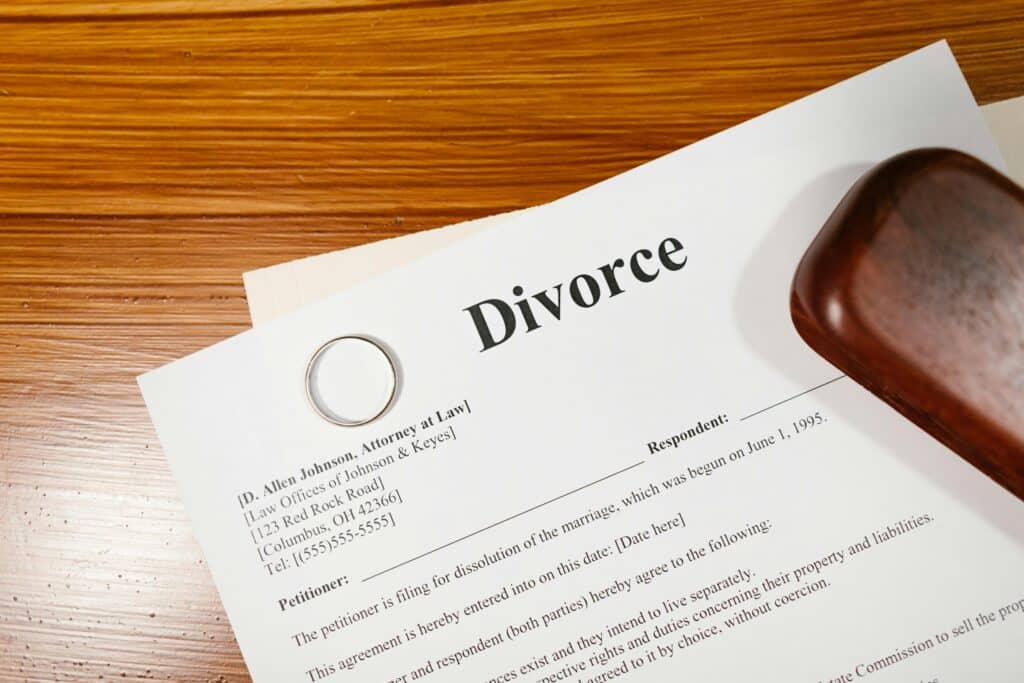
Addiction can take a toll on any marriage and can often lead to divorce. But weathering the storm through recovery is worth it.
If substance use, whether that’s from prescription opioids, other illegal drugs or alcohol, has caused unsalvageable conflict in your marriage, you may be facing separation and divorce while also dealing with your addiction. This is a period when you may not be able to solve all of your problems as substance use disorder drains much of your energy and capacity to process intense and stressful situations.
Entering addiction treatment during this time can help you regain your bearings to deal with the course of redefining your relationships with your spouse and any children involved. There will be many emotional and mental hurdles to prepare for, but ultimately, long-term recovery is worth the fight.

Emotional Divorce Turbulence: Prepare to Feel in Recovery
If the threat or reality of divorce forced you into addiction treatment, the first few weeks of healing could be a very overwhelming and confusing time. On the one hand, you are facing the consequences of substance use and the way it tore apart your marriage. On the other hand, you are also taking measures to get help.
Although treatment may not fix your marriage, you will be able to handle your divorce proceedings with much more clarity and dignity. While you may have perilously relied on substance use to get you through difficult emotions, going through this event without the usual coping mechanism of escape through drugs will feel like an advantage.
The clarity of treatment will allow you to use your energy to regain your emotional and mental strength. However, feeling emotions fully will make sticking to treatment very challenging, which is why it’s important to set yourself up with a network of people who can help.
Building a Support Network During Divorce
This is the right time to reach out to family and friends for support. Going through treatment and divorce at the same time is a massive undertaking, and it’s essential to be around people who care about you.
If relations with your loved ones have also become strained through the time you battled your addiction, you may find it beneficial to invite them to substance use counseling sessions with you where a professional can help mediate these sometimes tough conversations.
Building up support from friends and family will help you stay committed to your treatment and recovery program and avoid relapse triggers like guilt, loneliness, and stress. Renewing and improving these relationships while going through your divorce can also help you rebuild your future in recovery.

Creating Stability and Preparing Accommodations
If you’ve lost access to housing and transportation through the process of entering addiction treatment and an impending divorce, things can quickly become infinitely more complex. Thankfully, there are tons of services available for people in your situation, including legal counsel.
Substance use counselors through your medication-assisted treatment program are an invaluable resource for finding aid as you work to regain your grounding while in recovery. Keep in mind every effort you make to rebuild your life in treatment will reflect favorably on the judge overseeing your divorce. Most importantly, it will help you through the adjustment phase of your next chapter.
A Cooperative Approach
If your spouse has made their final decision to go through with the divorce, you must have some understanding and perspective moving forward. The very raw feelings of anguish and heartbreak you feel at this point may be very similar to what your spouse felt when they endured the pitfalls of addiction with you.
They now need time to heal themselves, as well. Addiction is a family disease because it affects everyone who is in contact with someone who has substance use disorder, especially those closest to them. Cooperating with the proceedings would be beneficial for everyone involved, and using spiteful behavior to make things more problematic will only cause a more significant rift and keep you from healing, too.
If custody of children is involved, their best interest must be at the heart of all your actions. Kids are often the biggest victims of divorce, especially when one of the parents has struggled with substance use. Avoiding any additional trauma to your family will become a motivating factor in the near future.

Addressing Your Divorce While Prioritizing Your Recovery
Mourning the end of a marriage can sometimes feel like a death. If you believe your addiction was the reason for the split, it’s understandable that guilt and regret can become overwhelming. Although you cannot change your past actions and their consequences, the only way is to move forward.
Focusing on your treatment program, recovery and personal goals while preparing to address your divorce can help you deal with inevitable fears and anxiety about moving on with your life. Mental health plays a prominent role in how treatment will go, so taking advantage of counseling services during this time is a must.
Relapse prevention is also especially crucial during this period. Divorce rarely comes with “good timing” for most couples. Recognizing your vulnerabilities during the breakup can prompt you to start the grieving process all the way to the acceptance phase, which allows you to heal and forgive yourself eventually.
Indulge in Self-Care
While divorce can bring out your worst self-destructive tendencies, opting to do the exact opposite is the best strategy. Many people who have used substances to deal with unaddressed issues felt that they were taking care of themselves at some point. While in recovery, genuine acts of self-care can serve as an eye-opening experience.

Although it may be hard to take care of yourself while feeling guilt-ridden, consider it as a method of putting your best foot forward for the future. Divorce proceedings and the lifestyle change that comes with a marital split will be easier to handle if the mind and body are receiving adequate sleep, nutrition and exercise.
How AppleGate Recovery Can Help
Addiction treatment provides the tools to deal with all of life’s stressors, including major life changes you may not think you are ready for. While it’s going to be difficult to mourn the end of your marriage, using your support network and services available to you during your treatment program will help you along.
Our treatment centers at AppleGate Recovery can help provide you with comprehensive, outpatient, evidence-based addiction treatment. Contact us to learn more about what we have to offer and how we can get you on the road to recovery today.
